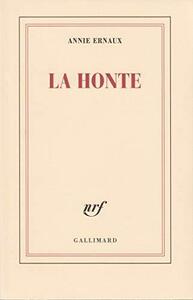You need to sign in or sign up before continuing.
Take a photo of a barcode or cover
Literally perfectly encapsulates the feelings and thought processes of adolescence
reflective
emotional
reflective
sad
fast-paced
lighthearted
fast-paced
informative
reflective
sad
slow-paced
2.5
Easily my least favorite Ernaux. No one can be perfect! There are nuggets of insight that make reading it worthwhile, but it doesn't strike me in the same way her others have. It feels as if she begins with her pre-Exteriors format, meaning that she hones in on the titular subject and dives into the depths of her internal life to such an honest and precise degree that she breaks open the memoir format and represents memory and subjectivity so intensely as to make them appear tangibly inhabitable. But this follows Exteriors, a work dedicated to the eponymous exteriors she records in her diary as a means of recording personal and cultural history through her destabilization and attempted elimination of any historical voice to guide you. So she goes from the successful experiment of Exteriors and tries to merge it with her usual style and writes Shame, and it's a total flop. It comes to an end and you have a good time because Annie Ernaux can't seem to really overly bore you (I mean, every work of hers is literally less than a hundred pages, so you'd hope she wouldn't bore you by then) but by the end the work seems to simply reflect the ways in which social expectation, primarily that which is grounded in class, bleeds into individual notions of what is shameful, but it doesn't do much more than that. I like reading more about her parents though for the first quarter and last bit of the book. I feel like they've become real people in my mind and with every book they appear in I feel like I'm revisiting people across the Atlantic that I've come to know fairly intimately. Glad I've read it as I continue to complete Ernaux's body of work, but I feel like I'd only really LOVE this if it had been one of the first Ernaux texts I'd read.
Easily my least favorite Ernaux. No one can be perfect! There are nuggets of insight that make reading it worthwhile, but it doesn't strike me in the same way her others have. It feels as if she begins with her pre-Exteriors format, meaning that she hones in on the titular subject and dives into the depths of her internal life to such an honest and precise degree that she breaks open the memoir format and represents memory and subjectivity so intensely as to make them appear tangibly inhabitable. But this follows Exteriors, a work dedicated to the eponymous exteriors she records in her diary as a means of recording personal and cultural history through her destabilization and attempted elimination of any historical voice to guide you. So she goes from the successful experiment of Exteriors and tries to merge it with her usual style and writes Shame, and it's a total flop. It comes to an end and you have a good time because Annie Ernaux can't seem to really overly bore you (I mean, every work of hers is literally less than a hundred pages, so you'd hope she wouldn't bore you by then) but by the end the work seems to simply reflect the ways in which social expectation, primarily that which is grounded in class, bleeds into individual notions of what is shameful, but it doesn't do much more than that. I like reading more about her parents though for the first quarter and last bit of the book. I feel like they've become real people in my mind and with every book they appear in I feel like I'm revisiting people across the Atlantic that I've come to know fairly intimately. Glad I've read it as I continue to complete Ernaux's body of work, but I feel like I'd only really LOVE this if it had been one of the first Ernaux texts I'd read.
Shame is Ernaux’ memoir of 1952, when she was 12 years old and focuses on her experiences in daily life, at school, her relationship with her parents and one particular incident which helped shape her identity and future.
fast-paced
Leggere questo libro è stato come trovarsi di fronte ad una persona cara più grande di noi, ascoltarla silenziosamente, senza mai interromperla, mentre lei racconta la sua vita e le implicazioni sociali, culturali, di genere della realtà che descrive. Veramente ben scritto.



